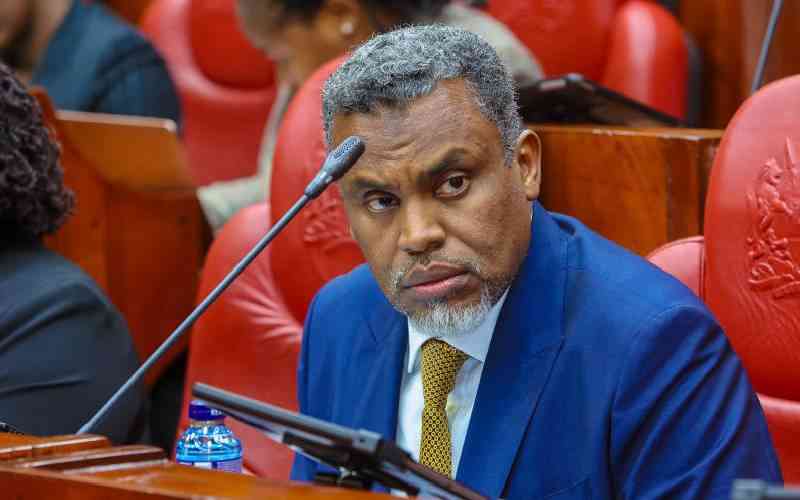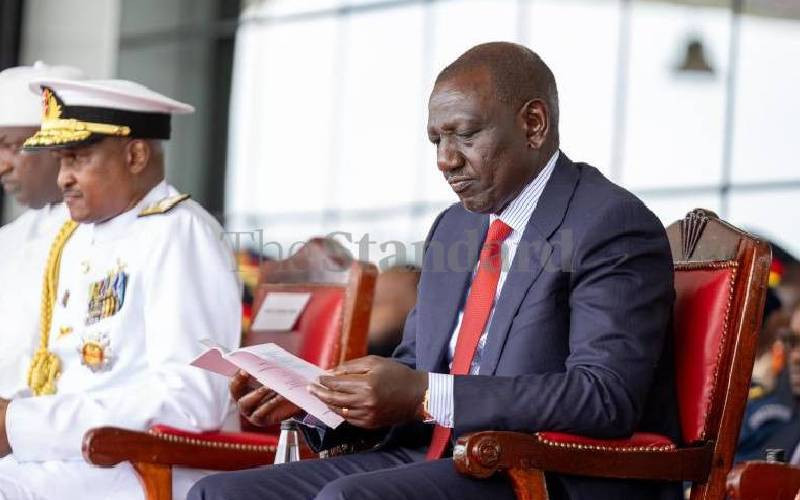
The possibility that Kenya could default on the $2 billion (Sh320 billion) Eurobond tops the list of threats the economy faces this year, according to Stears, a data intelligence firm.
The firm in its latest report also cites the depreciation of the shilling and domestic insecurity, specifically Al Shabaab and rising banditry cases in parts of the Rift Valley, among other key threats.
The ranking of these threats is listed from zero to five. Zero means no likelihood and no impact, while one to three means average likelihood and impact.
Four to five, on the other hand, means high likelihood and high impact.
The risk of Kenya defaulting on Eurobond due to dollar shortages has a probability of one even as the impact has a score of five.
"Kenya is unlikely to default on its Eurobond maturity, but should it happen, the impact on the economy would be detrimental," the report says.
The government in December paid some Sh11 billion in interest on the Sh320 billion Eurobond.
This payment was made possible by the government normalising its relationship with lenders, which unlocked more than Sh140 billion in funding.
The additional borrowing informed some of the tax measures implemented by President William Ruto's administration even as he insisted during the State of the National address that it was necessary since the country was living beyond its means.
While the government ruled out the possibility of a buyback of the Eurobond debt last year, Stears says owing to the debt burden and availability of the much-needed dollars, Kenya might reconsider the rescinded decision.
"With over $1 billion (Sh160 billion) inflow expected in the first quarter of this year from multilateral and bilateral lenders, the government may reconsider the buy-back.
"However, the bets are on the government solely depending on external financing to foot the repayment," the report says.
Stears notes that the debt buyback will ease the Eurobond repayment burden ahead of June this year.
Stay informed. Subscribe to our newsletter
"Resilient growth, moderating inflation and a less aggressive currency depreciation will persist," it adds.
The report projects that if the government is still adamant about a buyback plan, the other option would be to draw down on whatever is remaining on its reserves to pay the loan.
The shilling, however, will not have a soft landing if the government takes this option.
"A fiscal crisis could emerge," says Stears. "The Kenya shilling would come under attack, with monthly depreciation of a round two to three per cent."
Additionally, a full drawdown of the Sh320 billion is less likely due to already existing commitments from multilateral and bilateral lenders.
In this case, the government will continue depending on external finance from funders like the International Monetary Fund (IMF) to pay the debt.
The third option is for the country to default, which Stears notes that is unlikely because the government has international support and would be detrimental to Kenya's ranking on sovereign debt.
"A default is unlikely with international support. Plus, the government plans to boost revenue to avert this scenario at all costs," the report published on January 15 says.
The possibility of the Eurobond default, the report indicates, raises fears about the liquidity of forex reserves even as it postulates that the shilling would cross the Sh160 mark by the first half of the year.
The dollar has been exchanging at Sh160 against the shilling even as the unofficial exchange rate is more than that.
Stears puts the probability of further depreciation of the local unit at four, with an impact score of five, representing high likelihood and high impact.
"Currency depreciation will persist, but a closer alignment of the Kenya shilling to its fair value enhances investor appeal," the report says.
It, however, foresees the Central Bank of Kenya (CBK) continuing with its monetary policy measures even as it postulates inflation to average 6.0 per cent and 7.4 per cent, which is within the CBK target of 5+/-2.5 per cent.
This is fairer compared to 7.8 per cent in 2023 and 7.6 per cent in 2022.
"The shift towards more orthodox monetary policy measures alongside the CBK's surprise rate hike by 200 basis points in December 2023 and is expected to slow the shilling's depreciation ahead of the Eurobond repayment in June 2024," the report says.
The government will target tea, coffee, and horticulture exports as it seeks to replenish forex reserves.
This is as tourism is expected to take a hit due to domestic insecurity. This has a probability of three (average likelihood and impact) and an impact score of five (high likelihood and high impact).
"Revenue from the tourism/hospitality sector is under threat in the face of domestic insecurity attacks," the report says.
Export earning is also expected to be negatively impacted (ranking of four for both probability and impact: high likelihood and high impact), which Stears links to geopolitical tensions spread in key destinations like Egypt. The report foresees higher Pay As You Earn (PAYE) and improved tax collection from corporates and their subsidiaries as the government targets to raise revenues by 16 per cent this year.
There will also be an emphasis on remittances, particularly from the United States, which accounts for over 50 per cent of diaspora remittances and sustaining the plan to cut off non-performing State agencies through the Privatisation Bill.
Other threats that the economy is expected to tackle include nationwide protests with a probability of two and an impact of four and the tightening of global monetary policy, which Stears says could ease the debt burden on developing economies like Kenya. Another is the Russia-Ukraine war, which will affect petroleum import bill even as the conflict tapers.
 The Standard Group Plc is a
multi-media organization with investments in media platforms spanning newspaper
print operations, television, radio broadcasting, digital and online services. The
Standard Group is recognized as a leading multi-media house in Kenya with a key
influence in matters of national and international interest.
The Standard Group Plc is a
multi-media organization with investments in media platforms spanning newspaper
print operations, television, radio broadcasting, digital and online services. The
Standard Group is recognized as a leading multi-media house in Kenya with a key
influence in matters of national and international interest.
 The Standard Group Plc is a
multi-media organization with investments in media platforms spanning newspaper
print operations, television, radio broadcasting, digital and online services. The
Standard Group is recognized as a leading multi-media house in Kenya with a key
influence in matters of national and international interest.
The Standard Group Plc is a
multi-media organization with investments in media platforms spanning newspaper
print operations, television, radio broadcasting, digital and online services. The
Standard Group is recognized as a leading multi-media house in Kenya with a key
influence in matters of national and international interest.





